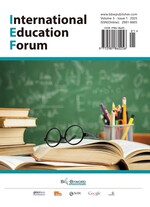Abstract
With the rapid development of higher education, industry-university cooperation has emerged as a crucial approach to enhancing the practical and innovative abilities of college students. However, the current practical teaching model for college students faces significant challenges and problems in the context of industry-university collaboration. On one hand, the teaching model suffers from fundamental deficiencies, including a disconnect between theory and practice, low levels of enterprise participation, and insufficient cultivation of students’ practical abilities. On the other hand, specific issues such as a single cooperation model, mismatched teaching content with enterprise requirements, and a lack of practical platforms further constrain the effective enhancement of students’ practical skills. Experimental testing conducted in this study revealed that the measures applied to the experimental group positively impacted students’ practical and innovative abilities, leading to higher innovation scores in the experimental group compared to the control group.
References
Awasthy R, Flint S, Sankarnarayana R, et al., 2020, A Framework to Improve University-Industry Collaboration. Journal of Industry-University Collaboration, 2(1): 49–62. https://doi.org/10.1108/JIUC-09-2019-0016
Giang NTH, Hai PTT, Tu NTT, et al., 2021, Exploring the Readiness for Digital Transformation in a Higher Education Institution Towards Industrial Revolution 4.0. International Journal of Engineering Pedagogy, 11(2): 4–24. https://doi.org/10.3991/ijep.v11i2.17515
Etzkowitz H, Dzisah J, Clouser M, 2022, Shaping the Entrepreneurial University: Two Experiments and a Proposal for Innovation in Higher Education. Industry and Higher Education, 36(1): 3–12. https://doi.org/10.1177/0950422221993421
Koutsouris G, Mountford-Zimdars A, Dingwall K, 2021, The ‘Ideal’ Higher Education Student: Understanding the Hidden Curriculum to Enable Institutional Change. Research in Post-Compulsory Education, 26(2): 131–147. https://doi.org/10.1080/13596748.2021.1909921
Li K, Jing M, Tao X, et al., 2023, Research on Online Management System of Network Ideological and Political Education of College Students. International Journal of Electrical Engineering Education, 60(2_suppl): 377–388. https://doi.org/10.1177/0020720920983704
Aithal PS, Adithya KM, Pradeep MD, 2022, Holistic Integrated Student Development Model & Service Delivery Model–A Best Practice of Srinivas University, India. International Journal of Case Studies in Business, IT and Education (IJCSBE), 6(1): 590–616. https://doi.org/10.47992/IJCSBE.2581.6942.0181
Chen Z, 2024, Exploring the Application Scenarios and Issues Facing Metaverse Technology in Education. Interactive Learning Environments, 32(5): 1975–1987. https://doi.org/10.1080/10494820.2022.2133148
Resch K, Schrittesser I, 2023, Using the Service-Learning Approach to Bridge the Gap Between Theory and Practice in Teacher Education. International Journal of Inclusive Education, 27(10): 1118–1132. https://doi.org/10.1080/13603116.2021.1882053
Huang X, 2021, Aims for Cultivating Students’ Key Competencies Based on Artificial Intelligence Education in China. Education and Information Technologies, 26(5): 5127–5147. https://doi.org/10.1007/s10639-021-10530-2
Ling Y, Chung SJ, Wang L, 2023, Research on the Reform of Management System of Higher Vocational Education in China Based on Personality Standard. Current Psychology, 42(2): 1225–1237. https://doi.org/10.1007/s12144-021-01480-6
Resch K, Alnahdi G, Schwab S, 2023, Exploring the Effects of the COVID-19 Emergency Remote Education on Students’ Social and Academic Integration in Higher Education in Austria. Higher Education Research & Development, 42(1): 215–229. https://doi.org/10.1080/07294360.2022.2040446
Kim J, 2024, Leading Teachers’ Perspective on Teacher-AI Collaboration in Education. Education and Information Technologies, 29(7): 8693–8724. https://doi.org/10.1007/s10639-023-12109-5
Fischer B, Guerrero M, Guimón J, et al., 2021, Knowledge Transfer for Frugal Innovation: Where do Entrepreneurial Universities Stand? Journal of Knowledge Management, 25(2): 360–379. https://doi.org/10.1108/JKM-01-2020-0040
